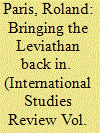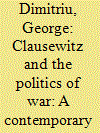| Srl | Item |
| 1 |
ID:
075357


|
|
|
|
|
| Publication |
2006.
|
| Summary/Abstract |
There are crucial differences between classical and contemporary conceptions of the liberal peace thesis, or the proposition that liberally constituted states tend to be more peaceful in domestic affairs, in their relations with other states, or both. Classical liberals such as Locke and Kant believed that peace depended not only on liberal political and economic arrangements but also on a functioning state apparatus, capable of upholding the rule of law and containing societal competition within peaceful bounds. By contrast, modern liberal peace scholars have tended to treat functioning state institutions as a given, focusing instead on the relationship between violent conflict and different types of (already constituted) regimes. As a result, findings from modern scholarship do not necessarily apply to states just emerging from civil wars with damaged, dysfunctional, or nonexistent governmental institutions. Given the abundance of post-conflict peacebuilding operations and failed or failing states in the world today, liberal peace scholars would do well to revisit classical liberalism's dual emphasis on building liberal and effective states as a foundation for peace.
|
|
|
|
|
|
|
|
|
|
|
|
|
|
|
|
| 2 |
ID:
173420


|
|
|
|
|
| Summary/Abstract |
This paper re-examines the theoretical underpinnings of Strategic Studies, proposing a novel theory and a new framework for analysing war’s fundamental relationship with politics in line with the Clausewitzian tradition. Throughout modern history, Clausewitz’s concept of politics has been misconstrued as referring only to policy whereas in fact, for him, ‘politics’ was a much broader concept, including domestic power struggles. The political logic of war is defined here as the convergence of the interrelating factors of power struggles and policy objectives within a given polity that restrains and enables these political forces. The analysis of the Clausewitzian political logic of war is conducted through the sociological ‘liquid modern’ lens. It is argued that with power increasingly shifting from centralised state-oriented political leadership towards market forces, non-state actors and other political bodies, the effectiveness of war has been reduced. This is evident in the fragmentation of Western political systems and, as a result, suboptimal strategy and the domination of domestic power struggles in political decision-making concerning war.
|
|
|
|
|
|
|
|
|
|
|
|
|
|
|
|